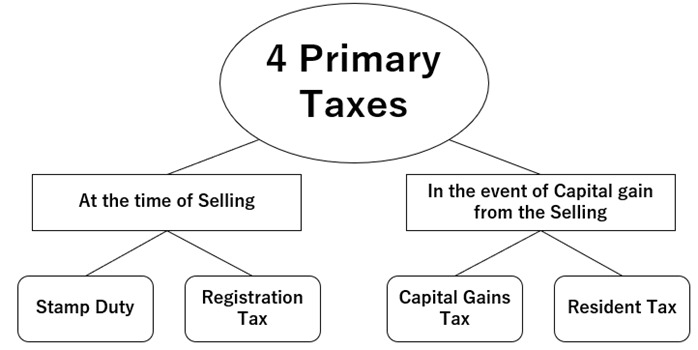2025 03/25
A Comprehensive Guide to Real Estate Taxes when Selling Property in Japan

The appeal of Japan's real estate market is undeniable. Diverse properties and unique cultural landscape attract foreigners from around the world.
However, the intricacies of Japan’s tax system can be a daunting task, particularly when it comes to selling your real estate. Although some tax deductions are available, those deductions often require you to make a self-declaration to take advantage of them. Therefore, a thorough understanding of the tax landscape is crucial.
This comprehensive guide will walk you through the various types of taxes related to selling a property in Japan. It aims to provide you with the knowledge needed to make informed decisions and maximize your future capital gain.
*The laws, exceptions, and taxes mentioned below are based on the situation as of March 2025.
Understanding the Tax Landscape: A Primer for Foreigners
When selling real estate in Japan, four primary taxes come into play:

At the time of selling :
I. Stamp Duty: A tax applied to the written contract when purchasing or selling real estate. Its amount depends on the property price.
II. Registration Tax: Paid to a judicial scrivener registering the mortgage discharge and the address change when required.
In the event of capital gain from the selling :
III. Capital Gains Tax: This is the most significant tax levied on profits earned from selling real estate. In case you incur a loss by selling your real estate, you can offset the loss against gains on other income to reduce your income taxes.
IV. Resident Tax: This local tax, based on last year’s annual income, is levied by the municipality where the property is located starting from the year following the sale.
Real estate agents generally inform you about the exact amounts for the stamp duty and the registration tax during the transaction. Since tax calculations especially for the income tax often require tough work for you, it is better to ask real estate agent for the brief estimation.
Also making a firm grasp of its complexity with tax accountant is essential.

Decoding Income Tax: A Detailed Breakdown
To accurately estimate your capital gains tax liability, let's break down the calculation process step-by-step:
Step 1: Calculating the Capital Gains
The formula for calculating capital gains is straightforward:
Capital Gains = Selling Price – (Acquisition Cost + Selling Expenses)
Let's illustrate this with an example:
Imagine you sell a property for ¥40,000,000, which you originally purchased for ¥30,000,000 includes the purchase expenses. The selling expenses involved in the transaction, such as the agent fee and other charges, amount to ¥1,500,000 expecting to be 3.75% of the selling price. Plugging these figures into the formula:
Selling Price - (Acquisition Cost + Selling Expenses)
Capital Gains = ¥40,000,000 - ( ¥30,000,000 + ¥1,500,000 ) = ¥8,500,000
In this scenario, your capital gains would be ¥8,500,000.
Tips for Capital Gains Calculation:
• Acquisition Cost: It encompasses the original purchase price, including the purchase expenses such as Agent Fees, Stamp Duty, and Registration Fee.
• Selling Price: This includes not only the actual selling price but also any other settlement adjustments for Property Taxes (Fixed Asset Tax and City Planning Tax) that are paid by the buyer to the seller at closing.
Step 2: Checking for Deductions
The Japanese tax system offers specific deductions designed to mitigate the tax burden on real estate sales to Japanese residents. It also applies to non-residents of Japan if they meet the conditions. Most popular deductions are listed below and these can be applied to only primary residence, not for investment properties:
I. 30 million yen Deduction for the Transfer of Residential Property
This deduction allows you to deduct up to ¥30,000,000 from your capital gains when selling a primary residence, potentially reducing your tax liability to zero.
To be qualified, you must meet the following conditions:
• Selling your primary residence
• Currently living in the residence or within 3 years of moving out
• Not having used this deduction within the past 3 years etc.
II. Tax Reduction for Long-term Ownership
If you've owned the property for over 10 years, you're eligible for a reduced tax rate.
• No more than ¥60,000,000: 14.21% (Income tax : 10.21%, Resident tax : 4%)
• Over ¥60,000,000: 20.315% as original (Income tax : 15.315%, Resident tax : 5%)
III. Special Exemption for the Transfer of Residential Property with an Outstanding Housing Loan
This exemption is applicable if you sell your primary residence with an outstanding housing loan and the selling price is less than the outstanding loan balance. Only those that meet certain requirements can deduct the Capital Loss from other income for the year.
Also, the Capital Losses not yet deducted can be carried forward and deducted for up to 3 years following the year of the transfer.
“30 million yen Deduction for the Transfer of Residential Property” and “Tax Reduction for Long-term Ownership” can be used simultaneously.
Step 3: Applying the Tax Rate
The tax rate for Income Tax and Resident Tax applied to your Capital Gains depends on the holding period of the property:
• Short-term Capital Gains (Holding period 5 years or less)
→39.63% [Income Tax : 30.63%, Resident Tax : 9%]
• Long-term Capital Gains (Holding period over 5 years)
→20.315% [Income Tax : 15.315%, Resident Tax : 5%]
*Non-resident of Japan are exempt from Resident Tax.
*The period is calculated based on the ownership duration as of January 1st of the year in which the asset is sold.
Example: Calculating the Tax Liability
Let's calculate the tax liability assuming a capital gain of 50 million yen with some different conditions.
・A holding period of less than 5 years, and no special exemptions or deductions (Japanese Resident Only):
Tax Liability = ¥50,000,000 (Capital Gains) × 39.63% (Income Tax : 30.63%, Resident Tax : 9%)
= ¥19,815,000
・A holding period of over 10 years with the Transfer of Residential Property (Japanese Resident Only) :
Tax Liability =〔¥50,000,000 (Capital Gains) - ¥30,000,000 (30 million yen Deduction)〕
× 20.315% (Income Tax : 15.315%, Resident Tax : 5%)
= ¥4,063,000
・A holding period of over 10 years with the Transfer of Residential Property (Non-Resident of Japan)
Tax Liability = ¥50,000,000 (Capital Gains) × 15.315% (Income Tax Rate)
= ¥7,657,500

Maximizing Your Returns: Key Takeaways for Foreigners
By understanding the various taxes involved, leveraging available deductions, and planning your transactions strategically, you can minimize your tax burden and maximize your return.
• Keep Meticulous Records: Keep the detailed records of the payment such as the acquisition cost and selling expenses for accurate tax calculations.
• Plan Your Sale Strategically: Consider the holding period and applicable tax benefits to figure out when you should sell your property. Looking at the sale from a long-term perspective can help you reduce your tax liabilities and optimize your capital gains.
• Consult with Tax Professionals: Seek advice from Certified Public Tax Accountants (Zeirishi ) who can provide tailored guidance for your specific situation.
Selling a real estate offers compelling opportunities to consider your asset formation in Japan. It is essential to have a clear understanding of the tax landscape in order to take advantage of the tax deductions effectively.
HouseRep Tokyo is ready to assist you with your first steps in selling your property!
